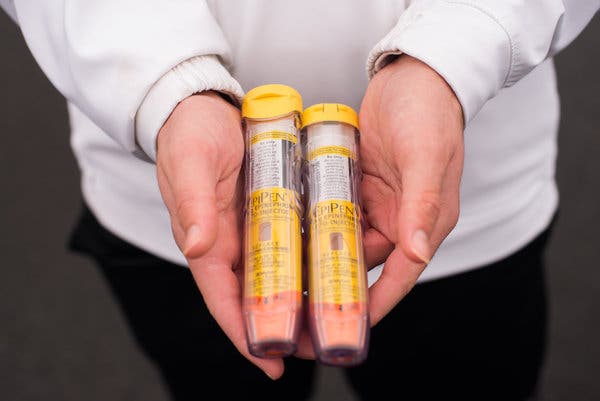At some point in our lives, we will experience bumpy skin, itchy eyes, nausea, or sneezing. The most common cause? An allergy.

Hairfinder
Your immune system is in charge of fighting bacteria and viruses to defend your body. But sometimes, it fights certain substances that are typically not harmful to the human body. When your body reacts to these substances, which is known as allergens, it causes an allergic reaction. It is still unclear why some people experience allergies. It is believed that it can be inherited and if you have a close family member who has an allergy, your risk in developing one is increased.
Although the reason why some people develop an allergic reaction to harmless substances is mainly unknown, we can identify the common substances that cause an allergic reaction. You can touch, inhale, or eat these allergens. Food, insects, drugs, latex, mold, pet, and pollen can be allergens. It is essential to figure out which substance is causing your allergy because the best way to prevent an allergic reaction is to avoid the allergens. To diagnose allergies, doctors can sometimes use allergens or even inject them into your body as a form of treatment.
Some cases of allergy are mild and can be treated by over-the-counter medicine. However, some could be life-threatening and require serious attention. The following are the common types of allergy and the allergic reaction they cause.
Skin Allergy
Skin allergies come in different forms, and the reactions can vary. It happens when your skin is in contact with an allergen such as a chemical in soap, lotion, sunscreen, perfumes, shaving lotion, or nickel. The most common skin allergy is atopic dermatitis or eczema. You may get rashes, hives, redness, itching, peeling, or flaking. However, you may not get a reaction right away, sometimes it can take a few hours to 10 days.
Most skin allergies can fade on their own even without treatment from the doctor, but to relieve the symptoms you can wear loose clothing, take a cool shower, soak in a milk bath, apply hydrocortisone cream, or use calamine lotion. If the allergy lasts for more than a few weeks and it really bothers you, you should see your doctor. Your doctor can prescribe strong antihistamines or steroids that can help you feel better quicker.
Nasal Allergy
Also known as hay fever or allergic rhinitis, it can cause sneezing, stuffy nose, runny nose, itching of the nose and roof of the mouth, as well as watery red eyes. If you experience these symptoms, you can have seasonal or year-round allergies. Seasonal allergies happen only at certain times every year and the main cause is pollen. However, year-round allergies may be caused by dust mites, mold, or pet dander. You can treat the allergy in several ways, including medication, home remedies, and alternative medicines.
You should limit your exposure to substances that causes your allergy. Then, you can take over-the-counter antihistamines such as fexofenadine (Allegra), diphenhydramine (Benadryl), or desloratadine (Clarinex). You can also use decongestants over a short period to relieve stuffy nose and sinus pressure. The most popular over-the-counter decongestants are oxymetazoline (Afrin nasal spray) and pseudoephedrine (Sudafed). Make sure to talk to your doctor before trying any new treatment.
When the symptoms do not go away after several weeks, you may need to make an appointment with your doctor. Your doctor can give you prescribed nasal corticosteroids. If medications do not relieve the symptoms or cause too many side effects, your doctor may recommend immunotherapy (allergy shots). Immunotherapy requires a long-term commitment, but it will decrease your immune response to particular allergens over time.
Food Allergy

Intermountain Healthcare
Food allergies can come suddenly, and even a small amount of allergy-causing food can trigger it. It is vital to know what type of food gives you an allergic reaction. The majority of food allergies are triggered by shrimp, peanuts, fish, eggs, cow’s milk, wheat, and soy. The signs and symptoms include digestive problems, hives, swollen airways, tingling or itching in the mouth, swollen lips or other parts of the body, diarrhea, nausea, vomiting, wheezing nasal congestion, or dizziness.
Food allergy can be dangerous, so caution is always recommended. To prevent an allergic, you will need to be careful at restaurants and always thoroughly check ingredient labels on food products. Mild allergic reactions can be treated with over-the-counter antihistamines such as Benadryl. You can also take alternative medications such as acupuncture.
Anaphylaxis

The New York Times
All of the allergies mentioned above can lead to a life-threatening allergic reaction called anaphylaxis. It is deadly, and it needs to be treated right away. It can put your body into shock, and it is mostly caused by food, medications, insect bites, or latex. It is rare, and most people recover from it. Nevertheless, you should always be careful and cautious if you have an allergy. Tell your doctor about any drug allergies, avoid consuming food that you are allergic to, or wear a medical alert bracelet and carry a card with information about your allergy.
The first signs may look like a typical allergy, like a runny nose or a skin rash. But a more serious sign can appear within 30 minutes. You may experience more than one symptom, such as coughing, wheezing, tightness in your chest, fainting, confusion, weakness, hives, vomiting, weak pulse, swollen throat, or itchy tongue.
If you have had previous attacks and know that you are at risk of anaphylaxis, your doctor may prescribe medicine that you treat yourself with, such as EpiPen, Adrenaclick, Auvi-Q, Symjepi, or other generic versions of an epinephrine auto-injector. You must always carry this medicine with you and tell your family and friends where you keep them. Epinephrine can reverse the symptoms within minutes, but if it does not happen, you may need to take a second shot within half an hour. Even when you have epinephrine, it is best to call for medical help right away. The medical personnel may put a tube down your mouth or nose to help your breathing and you probably will need to stay in the emergency room for more than a few hours to ensure you do not get a second reaction. Remember that you should not take an antihistamine for an anaphylactic reaction.